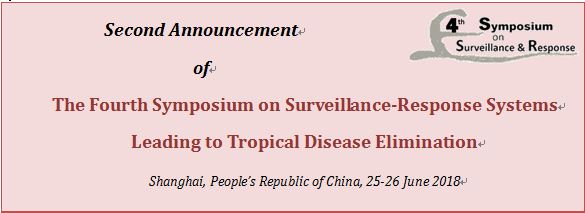Second Announcement of The Fourth Symposium on Surveillance-Response Systems Leading to Tropical Disease Elimination

Three previous symposiums on surveillance-response systems (SRS) aimed at organizing the final approach to the elimination of tropical diseases have taken place in Shanghai, People’s Republic of China. These symposia, held in 2012, 2014 and 2016, respectively, were co-sponsored by the National Institute of Parasitic Diseases (NIPD) of the Chinese Center for Disease Control and Prevention (China CDC) and the Swiss Tropical and Public Health Institute (Swiss TPH) in collaboration with the World Health Organization (WHO). The proceedings of these symposia have been published in the open-access journal Infectious Diseases of Poverty. Following these publications, the concept of SRS along with an action plan to promote this approach was included in national elimination programmes on tropical diseases, both in Asia and Africa. After the third symposium, the results from SRS pilot or demonstration projects were shared with particular respect to cooperation mechanisms with African and Asian countries. Operations initiated include the China-Zanzibar pilot project on schistosomiasis elimination; the China-UK-Tanzania pilot project on malaria control and elimination; and an institution-based network on China-Africa cooperation for schistosomiasis elimination (INCASE). In addition, ongoing research projects within the frame of the Regional Network on Asian Schistosomiasis and other Helminth Zoonoses (RNAS+) have been maintained for 20 years, with the new research projects promoted.
Triggered by the United Nations new Sustained Developing Goals (SDGs), which keep the focus on HIV/AIDS, tuberculosis and malaria from the Millennium Development Goals (MDGs), while enlarging this area to include efforts to end transmission of the neglected tropical diseases (NTDs), it is now important to scale up ongoing activities and ranges and put forward future direction through summarizing the pilot studies in order to improve the feasibility and acceptability on better promotion and implementation of the experiences obtained from the national research programmes. Particularly, more South-South cooperation and a larger scale of multi-lateral cooperation between China and other endemic countries will take place under the framework of the “Belt & Road Initiative” as proposed by Chinas President Xi Jinping. Therefore, the theme of the fourth symposium will be “Scale-up of Surveillance-Response Systems in National Efforts to Control and Eliminate Tropical Diseases through Cooperation and Promotion”, and it will focus on four topics: (i) innovative technology to improve SRS through platforms supported by essential databases; (ii) application in national control and elimination programmes on schistosomiasis, malaria, echinococcosis and imported diseases; (iii) new South-South cooperation on pilot studies in application of SRS; and (iv) evaluation of the feasibility and acceptability on better promotion and implementation of the experiences obtained from national research programmes.
The fourth symposium is predicted to attract more than 200 Chinese and international scientists, both from industrialized and developing countries, and several agreements on pilot research/control cooperation are expected to be signed. The venue will include several back-to-back meetings, such as (i) final evaluation meeting for the China-UK-Tanzania pilot project on malaria control and elimination; (ii) a third workshop on INCASE; (iii) an editorial meeting for the Infectious Diseases of Poverty journal; (iv) annual workshop of the RNAS+; and (v) the Second International Symposium for Cestode Zoonoses Control.
The tentative programme for the symposium includes a plenary lecture session, several group presentation sessions, round-table discussion and poster presentation. Plenary lectures by world-known scientists will be invited and all participants are welcome to submit abstracts on the three topics in advance for scrutiny by the symposium organization committee and potential selection for presentation. More information can be found at http://srs.ipd.org.cn/. For any logistic questions with regard to meeting participation, including invitation letters and visa support documents, please contact Ms. Ma Xuejiao (maxj@nipd.chinacdc.cn) or Ms. Ding Wei (dingwei@nipd.chinacdc.cn ).
The symposium committee provides travel grants for young scientists from developing countries based on the abstracts. Please block the dates and submit your abstract no later than 10 May 2018 at the following website:
http://demo.kucom.cn/srs/registration.php
Look forward to seeing you in Shanghai in June 2018.
Encl. Tentative Agenda
